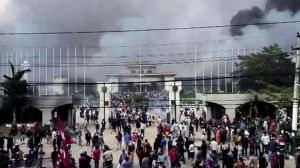Atri Mitra is a Special Correspondent of The Indian Express with more than 20 years of experience in reporting from West Bengal, Bihar and the North-East. He has been covering administration and political news for more than ten years and has a keen interest in political development in West Bengal. Atri holds a Master degree in Economics from Rabindrabharati University and Bachelor's degree from Calcutta University. He is also an alumnus of St. Xavier's, Kolkata and Ramakrishna Mission Asrama, Narendrapur. He started his career with leading vernacular daily the Anandabazar Patrika, and worked there for more than fifteen years. He worked as Bihar correspondent for more than three years for Anandabazar Patrika. He covered the 2009 Lok Sabha election and 2010 assembly elections. He also worked with News18-Bangla and covered the Bihar Lok Sabha election in 2019. ... Read More
Decode Politics: In Bengal’s tea gardens, why a TMC government decision makes for a bitter brew
Mamata Banerjee says 30% of tea garden land not being used to grow tea may be used for commercial purposes; her critics say this will leave struggling tea garden workers, indigenous tribes in a more precarious position
 West Bengal Chief Minister Mamata Banerjee visiting a tea garden in Jalpaiguri district. (Express archive)
West Bengal Chief Minister Mamata Banerjee visiting a tea garden in Jalpaiguri district. (Express archive)The West Bengal government’s decision to divert 30% of tea garden land for commercial purposes on a freehold basis rather than leasehold has stirred up opposition from locals and political organisations representing tea garden workers and poses a potential political challenge to the Trinamool Congress (TMC) government.
Chief Minister Mamata Banerjee announced the decision in her plenary speech at the Bengal Global Business Summit here on February 5. “We have taken some decisions. Now, wherever land is available in tea gardens, where tea plantations are not there, we will allow 30% for hotel business, commercial utilisation, and eco-tourism purposes,” she said.
What does the government’s decision mean?
All tea gardens are government land leased by tea garden owners. This land was given to them on the condition that it be used for tea cultivation and nothing else. In 2019, the TMC government allowed 15% of the land on leasehold for tourism and other activities.
By increasing this limit to 30% and allowing freehold ownership, or the right to use a piece of land for unlimited time, the government has given rise to the fear that this would further make the situation difficult for tea garden workers who are already struggling. It is likely to have consequences for tribal communities in the region.
What has been the Opposition’s response?
The move has drawn flak from not only mainstream political parties such as the CPI(M) and BJP and organisations representing tea garden workers but has also not gone down well with the TMC’s key ally in north Bengal, where these tea gardens are located. The chief concern is how the real estate industry, as a result of this, will alter land use and demography of the region.
The CPI(M)-affiliated Darjeeling District Chia Kaman Mazdoor Union’s president, Saman Pathak, said the decision would prove to be “fatal” for the tea industry. “The tea industry is the backbone of the economy in Darjeeling and North Bengal. Allowing 30% of tea garden land for commercial use will have disastrous consequences. The previous government policy of permitting 15% of land for tourism has already altered the demography of tea gardens. Doubling this percentage is unacceptable,” he said.
 CM Mamata Banerjee at the Makaibari tea garden at Kurseong. (Express archive)
CM Mamata Banerjee at the Makaibari tea garden at Kurseong. (Express archive)
BJP’s Darjeeling MP Raju Bista warned that the policy could leave indigenous communities such as the Gorkhas, Rajbangshis, Rabhas, Koches, Meches, and Totos homeless.
“This decision is extremely dangerous. Tea tourism has already led to the construction of luxury hotels and resorts on land cultivated by tea workers for generations. Now, the state government wants to further commercialise land for real estate development. This is deeply worrying,” Bista said.
“If this 30% land diversion policy is implemented, it will mark the end of the tea industry, allowing real estate to take over. After tea garden workers, cinchona garden workers, who have also been denied ancestral land rights, may face similar displacement,” the BJP leader said.
How have other organisations responded?
The Paschim Banga Cha Majdoor Samiti, an independent and non-party-affiliated trade union committed to protecting the rights of tea garden workers in north Bengal said the government’s decision was a “direct attack on the already struggling tea industry”.
Its president, Anuradha Talwar, alleged the move was a betrayal of the indigenous tribal population that had been “historically denied land rights”. She said the government’s decision to provide only five decimals of non-transferable patta land was a way of ensuring “tea workers are kept in perpetual uncertainty” and violates the International Labour Organization’s Indigenous and Tribal Populations Convention, 1957 (C107) that India has ratified and under which it has the responsibility to recognise the “land rights of the tribal population of the tea estates over the land that they are traditionally occupying”.
The Indian Gorkha Janshakti Front (IGJF) has also opposed the government’s “deeply unjust” decision” that “fails to recognise the historical, cultural and rightful claims of the indigenous residents of these regions”. In a letter to Banerjee, IGJF chief Ajoy Edwards said, “The tea garden workers and their families have been the backbone of the tea industry for centuries, yet their fundamental right to land ownership continues to be overlooked in favour of commercial interests.”
Edwards urged the CM to amend the West Bengal Land Reforms Act, if necessary, to ensure justice.
Could the TMC face any blowback?
Gorkha Territorial Administration (GTA) chairperson and TMC ally Anit Thapa has expressed unhappiness with the decision, saying, “The beauty of the hills will not be allowed to be destroyed. Some people will come to build new multi-storied buildings, but we will not allow it. It will be stopped at any cost.”
A section of TMC leaders also feels this may blow back on the party in a region where the BJP, despite electoral reverses in recent years, is on equal footing with the party. This, according to them, may help the BJP strengthen its hold on north Bengal.
“Tea garden labourers have lived there for hundreds of years. Others are indigenous residents of these areas. They did not get land rights even after fighting for decades. If the government give freehold to industrialists and not residents, it may go against us. We are not strong in the tea garden region and our vote may shrink further,” said a senior TMC leader from the region.
Photos



- 01
- 02
- 03
- 04
- 05





























